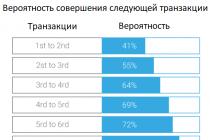Annuity and lifelong maintenance agreements with dependents are most often concluded by single pensioners who are left without the support of family and friends. These agreements allow them to provide themselves with the monthly income necessary for living or proper care in exchange for housing. But it is important to understand that, having concluded such an agreement, it is no longer possible to subsequently dispose of the assigned apartment in another way (sell, bequeath, donate). In general, concluding an annuity or lifelong maintenance agreement with a dependent is a very serious and responsible step. You need to think carefully, weigh the pros and cons, and only then make a decision.
WHAT IS THE DIFFERENCE
The most common is a life annuity agreement. This is what older people conclude in order to ensure a decent old age in exchange for housing.
There is also a lifelong maintenance agreement with dependents - this is a fundamentally different agreement
Very often older people do not understand the difference. And this can lead to very undesirable consequences. Therefore, we will analyze both of these agreements in detail.
The essence of a life annuity agreement comes down to the transfer of property by one person (the annuitant) to another (the annuity payer) into ownership. And in exchange, the payer undertakes to give a certain amount of money to the annuitant throughout his life. Typically, money is paid at the end of each calendar month. But the parties may set other deadlines in the contract.
The apartment can be transferred for payment of rent for a fee or free of charge.
If the apartment is transferred free of charge, the amount of rental payments per month must be no less than the cost of living established in the region. In addition, payments are subject to increase taking into account the increase in the cost of living.
If the apartment is transferred for a fee, some amount is paid for it in addition to monthly rent payments. That is, this is not a full buyout of the apartment (as in the case of a purchase and sale agreement), but a payment of some part of its value. The amount of such payment for the apartment is established by agreement of the parties. When an apartment is transferred for payment, the amount of rental payments may be less than the cost of living.
- Art. 585, 597, 598 Civil Code of the Russian Federation
The life annuity agreement does not provide for maintenance. Under such an agreement, a person receives only money and has no right to demand anything else. Therefore, if a person needs care (and not just a monthly cash amount), it is better to enter into a lifetime maintenance agreement with a dependent.
LIFETIME SUPPORT WITH DEPENDENTS
Under such an agreement, the annuity payer assumes responsibilities for providing the annuity recipient with social, household, medical and social services. For example, provision of food, clothing, care, payment for funeral services, etc. may also be provided. All this must be clearly stated. The apartment under such an agreement, as in the case of rent, can be transferred for a fee or free of charge.
If the apartment is transferred free of charge, the cost of maintenance per month cannot be less than two times the subsistence minimum established in the region.
If the apartment is transferred for a fee, the same principle applies as described for a lifelong annuity agreement. The cost of maintenance may be less than two times the cost of living.
The contract may provide for the possibility of replacing dependent support with money.
- Art. 601-603 Civil Code of the Russian Federation
As you can see, the terms of these two agreements are different. Therefore, before signing documents, you need to make sure that this is exactly the type of agreement that you intended to conclude.
WHOM TO MAKE AN AGREEMENT WITH?
A life annuity agreement or a lifelong dependency agreement can be concluded with either a person or a company.
It is impossible to say for sure which option is better. But it is necessary to take into account: the rent payer must be financially wealthy in order to always make payments on time and in full. And if we are talking about lifelong maintenance with a dependent, then the payer must still have the opportunity to care for a sick, sometimes bedridden person, or pay for the corresponding services.
The organization, as a rule, better meets the above criteria, since it has both finances and experienced personnel.
But concluding an agreement with a person also has its advantages. Often, elderly people entrust their care to good acquaintances whom they have known for many years and have already found a common language with them.
In any case, no matter which option you choose, be sure to find out how reliable this person (or company) is. Find out reviews, if possible, personally talk to people who have already concluded such agreements with them. If you choose a company, visit its office, personally communicate with the staff, carefully look at the documents, and the organization’s website on the Internet.
HOW TO DO EVERYTHING
A life annuity agreement and a lifelong maintenance agreement with dependents have the same registration procedure. Both agreements are certified by a notary. You will have to pay a state fee for certification of the contract. Its size will depend on the cost of the apartment: 0.5% of the cost of the apartment, but not less than 300 rubles. and no more than 20,000 rubles. If a notary office provides assistance in drawing up an agreement, it may charge an additional fee for this at its own rates.
After contacting a notary, you still need to register the transfer of ownership of the apartment with Rosreestr. The state fee for this procedure is 2000 rubles.
After the death of the rent recipient, the rent payer needs to contact Rosreestr again in order to finally register the apartment in his name. In this case, the duty is no longer paid.
Under such agreements, not only an apartment, but also movable property (for example, a car) can be transferred.
Then there is no need to contact Rosreestr. But the contract is still certified by a notary.
IS IT POSSIBLE TO CHANGE YOUR MIND?
Either one agreement or the other can be terminated by mutual agreement of the parties. If the rent payer does not agree to termination, it will be difficult to do so. We'll have to go to court.
The main basis for termination of the contract in court is a significant violation by the rent payer of its obligations.
The law does not specify what constitutes a material violation. Therefore, it is best to protect yourself in advance and clearly state in the contract what exactly the parties understand by such violations.
If the payer has violated the terms of the contract, you should not easily forgive him for the mistake, because this may be the first sign of bad faith. It is better to immediately take care of evidence of the violation. You can write a written claim and send it to the payer by mail with delivery notification, or give it in person and ask for an acceptance mark. If the case goes to court, the claim will be useful. Receipts for products or things that you bought yourself, but had to be purchased by the payer, will also help. The testimony of witnesses will also be useful (if they helped you resolve issues that, according to the contract, were the responsibility of the payer).
Also, a court can invalidate a contract if:
/ he was concluded under the influence of deception, threat, violence;
/you were materially misled when concluding the contract;
/ you entered into an agreement due to a combination of difficult circumstances on extremely unfavorable terms for you.
Of course, all these facts will have to be supported by evidence in court.
In general, it is extremely false to challenge annuity and lifelong maintenance agreements with dependents. The reasons must be really compelling. If the payer fulfills the agreement in good faith, and you simply change your mind and decide to take care of yourself and transfer the apartment to your heirs, it will be impossible to cancel the agreement since the rent payer himself will not meet you halfway.
To cancel, please call us and we will evaluate your options.
A rent contract is an agreement by virtue of which one party (rent recipient) transfers ownership of property to the other party (rent payer), and the rent payer undertakes, in exchange for the received property, to periodically pay rent to the recipient in the form of a certain amount of money or the provision of funds for its maintenance. in a different form (Article 583 of the Civil Code of the Russian Federation). An annuity contract is:
Real;
Paid;
Double-sided.
Permanent annuity is a permanent annuity contract. Life annuity - a life annuity agreement or a lifelong maintenance agreement for a citizen with a dependent. Recipients of rent can only be citizens, with the exception of recipients of permanent rent, which can also be non-profit organizations. There are no restrictions on the subject composition of rent payers. Every rent agreement is subject to notarization, and an agreement providing for the alienation of real estate for the payment of rent is also subject to state registration. Depending on the term of the contract, a distinction is made between permanent annuity (obligation to pay annuity
Perpetual) and life annuity (the obligation to pay annuity for the life of the citizen). As a general rule, the rights of a recipient of a permanent annuity are transferred, inherited or by succession to persons who may be recipients
annuities. The subject of a permanent and lifelong annuity agreement is both movable (including money) and immovable property. The subject of a lifelong maintenance agreement for a citizen with a dependent can only be real estate.
The size of the life annuity cannot be less than one
Minimum wage per month. The cost of the total amount of lifelong maintenance with dependents cannot be less than two minimum wages per month. For a permanent annuity there are no requirements for its minimum amount.
Unless otherwise established by the contract, the frequency of payment of a permanent annuity is at the end of each calendar quarter, and for a lifelong annuity - at the end of each calendar quarter.
months A permanent annuity contract may be terminated by the annuity payer buying it out on his own initiative or at the request of the annuity recipient. In addition to the redemption, the demand for which is the reaction of the annuity recipient to the failure of the annuity payer to fulfill his obligations, there are other grounds provided for by law (Article 593 of the Civil Code) or by agreement
40. Lease agreements and gratuitous use of property (loans): general provisions.
Under a lease (property lease) agreement, the lessor (lessor) undertakes to provide the lessee (tenant) with property for a fee for temporary possession and use or for temporary use. The fruits, products and income received by the lessee as a result of the use of the leased property in accordance with the agreement are his property. The property is leased together with all its accessories and related documents (technical passport, quality certificate, etc. If the lessor does not provide the leased property to the tenant within the period specified in the lease agreement, and in the event that such a period is not specified in the agreement indicated, within a reasonable time, the tenant has the right to demand this from him and demand compensation for losses caused by delay in performance, or demand termination of the contract and compensation for losses caused by its failure to perform. The lessor is responsible for the shortcomings of the leased property
The lessor, notified of the tenant's demands or his intention to eliminate the defects of the property at the expense of the lessor, may without delay replace the property provided to the tenant with other similar property that is in proper condition, or eliminate the defects of the property free of charge.
2. The lessor is not responsible for the shortcomings of the leased property that were agreed upon by him when concluding the lease agreement. The tenant is obliged to promptly pay fees for the use of the property (rent).
The tenant has the right, with the consent of the lessor, to sublease the leased property (sublease) and transfer his rights and obligations under the lease agreement to another person (release), provide the leased property for free use,
The lessor is obliged to carry out major repairs of the leased property at his own expense.
2. The tenant is obliged to maintain the property in good condition, carry out routine repairs at his own expense and bear the costs of maintaining the property, unless otherwise provided by law or the lease agreement.
An agreement for gratuitous use (loan agreement) is a civil law agreement, according to which one party (the lender) undertakes to transfer or transfers a thing for free temporary use to the other party (the borrower), and the latter undertakes to return the same thing in the condition in which in which she received it, taking into account normal wear and tear or in the condition stipulated by the contract.
A loan agreement (free use) can be concluded in two main forms.
Due to the gratuitous nature of such an agreement, a person who is interested in receiving property for gratuitous use (loan) must remember that the conclusion of a consensual agreement for gratuitous use (loan) does not guarantee him the receipt of this property, since the lender does not have the right to demand the transfer of such property by the borrower. It is considered concluded precisely at the moment of transfer of the thing.
Chapter 33. Rent and lifelong maintenance with dependents
§ 1. General provisions on annuity and lifelong maintenance with dependents
Article 583. Rent agreement
1. Under a rent agreement, one party (rent recipient) transfers ownership of property to the other party (rent payer), and the rent payer undertakes, in exchange for the received property, to periodically pay rent to the recipient in the form of a certain amount of money or the provision of funds for its maintenance in another form.
2. Under an annuity agreement, it is possible to establish the obligation to pay annuity indefinitely (permanent annuity) or for the life of the annuity recipient (lifetime annuity). Lifetime annuity can be established on the terms of lifelong maintenance of a citizen with a dependent.
Article 584. Form of rent agreement
Article 585. Alienation of property for payment of rent
1. Property that is alienated for the payment of rent may be transferred by the recipient of the rent into the ownership of the rent payer for a fee or free of charge.
2. In the case when the annuity agreement provides for the transfer of property for a fee, the rules on purchase and sale (Chapter 30) are applied to the relations of the parties regarding the transfer and payment (Chapter 30), and in the case when such property is transferred free of charge, the rules on the gift agreement (Chapter 32) insofar as otherwise is not established by the rules of this chapter and does not contradict the essence of the annuity agreement.
Article 586. Encumbrance of rent on real estate
1. Rent encumbers the land plot, enterprise, building, structure or other real estate transferred for its payment. In the event of alienation of such property by the rent payer, its obligations under the rent agreement are transferred to the acquirer of the property.
2. A person who has transferred real estate encumbered with rent into the ownership of another person shall bear subsidiary liability with him () for the claims of the rent recipient arising in connection with a violation of the rent agreement, unless this Code, another law or agreement provides for joint liability for this obligation.
Article 587. Security for payment of rent
1. When transferring a plot of land or other real estate for payment of rent, the recipient of the rent, as security for the obligation of the rent payer, acquires the right of pledge over this property.
2. An essential condition of an agreement providing for the transfer of a sum of money or other movable property against the payment of rent is a condition establishing the obligation of the rent payer to provide security for the fulfillment of his obligations () or to insure in favor of the annuity recipient the risk of liability for non-fulfillment or improper fulfillment of these obligations.
3. If the annuity payer fails to fulfill the obligations provided for in paragraph 2 of this article, as well as in the event of loss of security or deterioration of its conditions due to circumstances for which the annuity recipient is not responsible, the annuity recipient has the right to terminate the annuity contract and demand compensation for losses caused by termination of the contract.
Article 588. Liability for late payment of rent
For late payment of rent, the rent payer shall pay the rent recipient the interest provided for in Article 395 of this Code, unless a different amount of interest is established by the rent agreement.
§ 2. Constant rent
Article 589. Recipient of permanent annuity
1. Recipients of permanent annuity can only be citizens, as well as non-profit organizations, if this does not contradict the law and corresponds to the goals of their activities.
2. The rights of the annuity recipient under a permanent annuity agreement may be transferred to the persons specified in paragraph 1 of this article by assigning a claim and transferred by inheritance or by succession during the reorganization of legal entities, unless otherwise provided by law or agreement.
Article 590. Form and amount of permanent annuity
1. Permanent annuity is paid in money in the amount established by the contract.
A permanent annuity agreement may provide for the payment of annuity by providing things, performing work or providing services corresponding in value to the monetary amount of the annuity.
2. The amount of the permanent annuity paid, established by the permanent annuity contract, per month must be no less than the minimum subsistence level per capita established in accordance with the law in the relevant constituent entity of the Russian Federation at the location of the property that is the subject of the permanent annuity contract, and in the absence in the corresponding subject of the Russian Federation of the specified value is not less than the value established in accordance with the law
The amount of permanent annuity established by a permanent annuity contract at the level of the per capita subsistence minimum specified in paragraph one of this paragraph is subject to increase taking into account the increase in the corresponding per capita subsistence minimum.
Article 591. Terms for payment of permanent annuity
Unless otherwise provided by the permanent annuity agreement, permanent annuity is paid at the end of each calendar quarter.
Article 592. The right of the payer to repurchase permanent annuity
1. The payer of a permanent annuity has the right to refuse further payment of annuity by repurchasing it.
2. Such a refusal is valid provided that it is declared by the annuity payer in writing no later than three months before the termination of annuity payment or for a longer period provided for in the permanent annuity agreement. In this case, the obligation to pay rent does not terminate until the entire redemption amount is received by the annuity recipient, unless a different procedure for redemption is provided for in the contract.
3. The condition of the permanent annuity agreement regarding the refusal of the permanent annuity payer from the right to repurchase it is void.
The contract may provide that the right to repurchase a permanent annuity cannot be exercised during the life of the annuity recipient or for another period not exceeding thirty years from the date of conclusion of the contract.
Article 593. Redemption of permanent annuity at the request of the annuity recipient
The recipient of a permanent annuity has the right to demand redemption of the annuity by the payer in cases where:
the annuity payer is overdue for payment by more than one year, unless otherwise provided by the permanent annuity agreement;
the rent payer violated its obligations to ensure payment of rent ();
the rent payer has been declared insolvent or other circumstances have arisen that clearly indicate that the rent will not be paid to him in the amount and within the terms established by the agreement;
real estate transferred for payment of rent came into common ownership or was divided between several persons;
in other cases provided for by the contract.
Article 594. Redemption price of permanent annuity
2. In the absence of a condition on the redemption price in the permanent annuity agreement, under which the property is transferred for a fee for the payment of a constant annuity, the redemption is carried out at a price corresponding to the annual amount of annuity payable.
3. In the absence of a condition on the redemption price in a permanent annuity agreement, under which the property is transferred for payment of rent free of charge, the redemption price, along with the annual amount of rent payments, includes the price of the transferred property, determined according to the rules provided for in paragraph 3 of Article 424 of this Code.
Article 595. Risk of accidental destruction of property transferred for payment of permanent annuity
1. The risk of accidental loss or accidental damage to property transferred free of charge for the payment of permanent rent is borne by the rent payer.
2. In the event of accidental destruction or accidental damage to property transferred for payment for the payment of permanent annuity, the payer has the right to demand, accordingly, termination of the obligation to pay annuity or change the terms of its payment.
§ 3. Lifetime annuity
Article 596. Recipient of life annuity
1. Lifetime annuity can be established for the life of the citizen transferring property for payment of annuity, or for the life of another citizen specified by him.
2. It is allowed to establish a life annuity in favor of several citizens, whose shares in the right to receive annuity are considered equal, unless otherwise provided by the life annuity agreement.
In the event of the death of one of the annuity recipients, his share in the right to receive annuity passes to the surviving annuity recipients, unless otherwise provided by the life annuity agreement, and in the event of the death of the last annuity recipient, the obligation to pay the annuity is terminated.
3. An agreement establishing a life annuity in favor of a citizen who has died at the time of conclusion of the agreement is void.
Article 597. Amount of life annuity
1. Lifetime annuity is defined in the contract as a sum of money periodically paid to the annuity recipient during his life.
2. The amount of life annuity established by a life annuity agreement providing for the alienation of property free of charge, per month, must be no less than the minimum subsistence level per capita established in accordance with the law in the relevant constituent entity of the Russian Federation at the location of the property that is the subject of the life annuity agreement , and in the absence of the specified value in the corresponding subject of the Russian Federation, not less than the minimum subsistence level per capita established in accordance with the law for the Russian Federation as a whole.
The amount of the life annuity established by the life annuity agreement at the level of the per capita subsistence level specified in paragraph one of this paragraph is subject to increase taking into account the increase in the corresponding per capita subsistence level.
Article 598. Terms of payment of life annuity
Unless otherwise provided in the life annuity agreement, the life annuity is paid at the end of each calendar month.
Article 599. Termination of a life annuity contract at the request of the annuity recipient
1. In the event of a significant violation of the life annuity agreement by the annuity payer, the annuity recipient has the right to demand from the annuity payer the redemption of the annuity on the terms provided for in Article 594 of this Code, or termination of the agreement and compensation for losses.
2. If an apartment, residential building or other property is alienated free of charge for the payment of a lifelong annuity, the annuity recipient has the right, in the event of a significant violation of the contract by the annuity payer, to demand the return of this property with its value offset against the redemption price of the annuity.
Article 600. Risk of accidental destruction of property transferred for payment of life annuity
Accidental destruction or accidental damage to property transferred for the payment of a life annuity does not relieve the annuity payer from the obligation to pay it on the terms provided for in the life annuity agreement.
§ 4. Lifetime maintenance with dependents
Article 601. Lifetime maintenance agreement with dependents
1. Under an agreement of lifelong maintenance with a dependent, the annuity recipient - a citizen, transfers his residential house, apartment, land plot or other real estate into the ownership of the rent payer, who undertakes to provide lifelong maintenance with the dependent of the citizen and (or) a third party (persons) indicated by him.
2. The rules on life annuity apply to a lifelong maintenance agreement with a dependent, unless otherwise provided by the rules of this paragraph.
Article 602. Obligation to provide maintenance for dependents
1. The obligation of the rent payer to provide dependent maintenance may include providing for the needs for housing, food and clothing, and if the citizen’s health requires this, also caring for him. A lifelong maintenance agreement with dependents may also provide for payment by the annuity payer for funeral services.
2. The contract for lifelong maintenance with dependents must determine the cost of the entire amount of maintenance with dependents. At the same time, the cost of the total amount of maintenance per month under a lifelong maintenance agreement with dependents, which provides for the alienation of property free of charge, cannot be less than two values of the subsistence level per capita established in accordance with the law in the corresponding constituent entity of the Russian Federation at the location of the property that is the subject of the lifelong maintenance agreement maintenance with dependents, and in the absence of the specified value in the relevant subject of the Russian Federation, at least two values of the subsistence minimum per capita established in accordance with the law for the Russian Federation as a whole.
3. When resolving a dispute between the parties about the amount of content that is provided or should be provided to a citizen, the court must be guided by the principles of good faith and reasonableness.
Article 603. Replacement of lifelong maintenance with periodic payments
An agreement on lifelong maintenance with dependents may provide for the possibility of replacing the provision of maintenance with dependents in kind by payment of periodic payments in money during the life of the citizen.
Article 604. Alienation and use of property transferred to ensure lifelong maintenance
The annuity payer has the right to alienate, pledge or otherwise encumber real estate transferred to him to ensure lifelong maintenance, only with the prior consent of the annuity recipient.
The annuity payer is obliged to take the necessary measures to ensure that during the period of provision of lifelong maintenance with a dependent, the use of the specified property does not lead to a decrease in the value of this property.
Article 605. Termination of lifelong maintenance with a dependent
1. The obligation of lifelong maintenance with a dependent shall be terminated by the death of the annuitant.
2. In the event of a significant violation by the annuity payer of its obligations, the annuity recipient has the right to demand the return of real estate transferred to ensure lifelong maintenance, or payment of the redemption price to him under the conditions established by Article 594 of this Code. In this case, the rent payer has no right to demand compensation for expenses incurred in connection with the maintenance of the rent recipient.
A lifelong maintenance agreement with a dependent is a transaction in which the owner, who is the recipient of the rent, gives his real estate (apartment, house, land plot) to another citizen, who will be the payer of the rent. In this case, the property is transferred on the terms of lifelong maintenance and dependency of the owner. Such a transaction differs in the duration of the contract, which is limited by the death of the owner. All legal issues when drawing up an agreement are regulated by the Civil Code of the Russian Federation.
Lifetime maintenance with dependents is a relatively new type of relationship, but its relevance was and is undeniable. This is due, first of all, to solving the housing issue for citizens who undertake obligations to care and support another person in exchange for living space or land. On the other hand, the owner who has no relatives and, for health reasons or other reasons, is not able to take care of himself on his own is interested in this.
The rent payer can be an individual or a legal entity. However, in both cases there is a risk of dishonest fulfillment of obligations.
Dear readers!
Our articles talk about typical ways to resolve legal issues, but each case is unique. If you want to find out how to solve your particular problem, please contact the online consultant form on the right →
It's fast and free! Or call us by phone (24/7):
Parties to the agreement
A lifelong maintenance agreement with dependents is concluded between two parties:
- Recipient of the annuity;
- Rent payer.
If the payer is a legal entity, there are no legal requirements for it regarding organizational and legal forms. This means that you can conclude a transaction with commercial and non-commercial entities.
 A legal entity cannot act as a recipient. According to Russian legislation, annuity and lifelong maintenance with dependents can be provided to the following types of owners:
A legal entity cannot act as a recipient. According to Russian legislation, annuity and lifelong maintenance with dependents can be provided to the following types of owners:
- Former owner;
- A citizen who is a third party;
- Former owner and third party citizen.
All persons related to the agreement must be written down in the text of the document. If an annuity agreement with lifetime maintenance, in which a third party appears, does not include information about whose benefit it is drawn up, then such a document is considered invalid.
The legislation does not provide for restrictions regarding the age and health status of the annuity recipient. At the same time, such deals are concluded specifically with single citizens of retirement age.
Terms of a transaction
The party to the contract who transfers the property (apartment, private house, land, etc.) is obliged to provide evidence of ownership of it. The person to whom the property is transferred undertakes to support the former owner until the end of his life. It happens that not one person, but several specified in the contract may be dependent.
 The annuity payer can also be not a person, but a government agency, an insurance company, a religious society, etc. Under the terms of the agreement, this party assumes financial responsibility for the maintenance of the property and the recipient of the rent, including its treatment, food, clothing and care. The last paragraph must be spelled out separately and in as much detail as possible, since then it will be impossible to require the parties to fulfill obligations that are not specified in the text of the document. Financial expenses for the funeral after the death of a dependent are also borne by the owner, unless otherwise provided by the contract.
The annuity payer can also be not a person, but a government agency, an insurance company, a religious society, etc. Under the terms of the agreement, this party assumes financial responsibility for the maintenance of the property and the recipient of the rent, including its treatment, food, clothing and care. The last paragraph must be spelled out separately and in as much detail as possible, since then it will be impossible to require the parties to fulfill obligations that are not specified in the text of the document. Financial expenses for the funeral after the death of a dependent are also borne by the owner, unless otherwise provided by the contract.
Regardless of what is the subject of the rental, the property must not be in dispute or be leased.

Frequent errors during registration
You should not rush to draw up and sign a maintenance agreement with a dependent in order to subsequently receive an apartment, land or other real estate. This applies to both sides of the transaction. When drawing up an agreement, it is necessary to comply with certain rules, conditions and basic caution. To avoid the most common mistakes, you must:

You should also pay attention to the fact that a lifelong maintenance agreement with dependents must be drawn up in literate language and contain all the details and passport data of the parties. In this case, all necessary documents must be attached to it.
Main advantages and disadvantages
| Side | Advantages | Flaws |
|---|---|---|
| For a dependent |
|
|
| For the owner |
|
|
Cancellation of the contract
 Cancellation of a transaction occurs exclusively in court. To confirm the fact of violation of the terms of the agreement, it is necessary to provide significant evidence and witnesses who can confirm the grounds for termination of the transaction. If the owner has avoided paying utility bills for a long time, the owner has the right to demand compensation for damages in court.
Cancellation of a transaction occurs exclusively in court. To confirm the fact of violation of the terms of the agreement, it is necessary to provide significant evidence and witnesses who can confirm the grounds for termination of the transaction. If the owner has avoided paying utility bills for a long time, the owner has the right to demand compensation for damages in court.
This article will discuss how an annuity agreement differs from a lifelong maintenance agreement with dependents.
It is not uncommon for a situation to arise when an elderly relative wants to transfer an apartment to some relative or friend, and in return he wants to receive care and some money as an increase in his pension.
So, you need to figure out what is the essence of an annuity agreement and a lifelong maintenance agreement with a dependent, is there a difference between them, and if so, what is it?
An annuity contract is an agreement under which the annuity recipient transfers ownership of property to the annuity payer and in return receives periodic payments, or is provided with funds for maintenance in another form.
In legal theory, it is customary to distinguish three types of rent:
- permanent annuity;
- life annuity;
- lifelong maintenance with dependents.
For ease of understanding and practical application, you need to understand the difference between a permanent annuity agreement and a lifelong maintenance agreement with dependency.
Moreover, many legal theorists agree on the fact that rent is divided into these two types. At the same time, both permanent annuity and lifelong maintenance with dependency are a type of annuity contract.
The main and essential feature of a permanent annuity is the perpetual nature of the annuity payer’s obligation to pay annuity.
Lifetime annuity is established for the life of the citizen who transfers property for payment of annuity, or another person indicated by this citizen.
In addition, permanent annuity is the only one in which the recipient of the annuity can be not only a citizen, but also a non-profit organization.
With a lifelong annuity, the recipient can only be a citizen, with whose death the obligation to pay the annuity ceases.
Separately, it must be clarified that when concluding a permanent annuity agreement, with the death of the annuity recipient, the obligations do not terminate and it will be necessary to pay this annuity to the heirs of the recipient.
But at the same time, the rent can be redeemed. With a life annuity, only the annuitant can demand redemption. How annuity is purchased and at what cost should be discussed separately.
What else do you need to know about the differences between a permanent annuity contract and a dependent life contract?
Risk of accidental death. With a constant rent, if the property for rent was transferred free of charge, then the risk of accidental death is borne by the rent payer.
If the property for rent payment was transferred on a paid basis, then, in this case, the rent payer may demand termination of the obligation to pay rent, or change its conditions.
If, for example, an apartment burned down, which was transferred under a contract for lifelong maintenance with dependency, then this contract does not terminate, and the rent payer is obliged to pay the rent until the death of the rent recipient.
A permanent annuity agreement may provide for the payment of annuity in monetary terms, also in the form of providing any services or performing certain work.
A lifelong maintenance agreement with a dependent, in addition to providing the annuitant with housing, may also provide for the provision of medicines, food, and payment for funeral services (in relation to the annuitant).
The contract may specify the frequency of providing certain services to the rentee, for example, cleaning the apartment - once a week, cooking - daily, washing things - once a week.
The contract must provide for the cost of the entire amount of dependent care. This is a necessary condition for a lifelong dependency agreement. In the absence of such a condition, the contract may be considered not concluded.
It is also necessary to take into account that both a permanent annuity agreement and a lifelong maintenance agreement with dependents are subject to mandatory notarization, as well as registration of the transfer of ownership.














